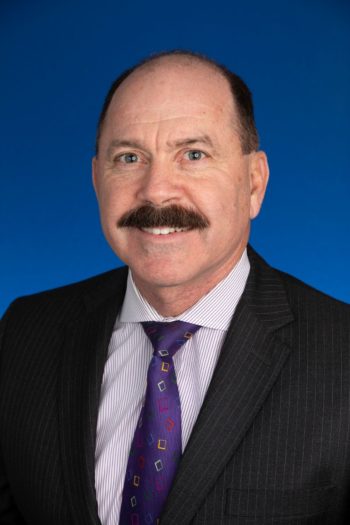NWRA Hall of Fame: Michael E. Hoffman
For Michael E. Hoffman, being an analyst is not just about observing and reporting on the waste and recycling industry; it’s about living it. For more than 32 years, Hoffman has dedicated his career to analyzing and guiding the industry, and as managing director and group head of diversified industrials at Stifel Financial Corp., he has been able to see the value of responsible waste management by looking beyond the profit and loss statement and balance sheet and taking the time to learn the ins and outs of the industry from the ground up.
Hoffman, who previously worked in the engineering field at GE and served as a U.S. Naval Reserve Officer for 10 years, entered the waste and recycling arena in the late 80s, working for Salomon Brothers on Wall Street. At the time, he knew little about the industry but was aware that he had to better understand the business models of the companies he was covering in order to become an unrivaled subject matter expert who companies and investors wanted to include in their conversations and go to for guidance on their investment choices.
“At the time, the space you know today as environmental services was known as pollution control, and there was enough coverage to have something in air, water, industrial waste and solid waste,” explains Hoffman. “As I started to build a franchise, I worked hard to ensure I had a good working knowledge of the business as well as cash flow generation, which I learned from one of my mentors Les Ravitz.”
To expand his knowledge of how the industry operates, and to keep a finger on the pulse of the industry, Hoffman began attending industry events and visiting private and public sector companies. As he expanded his network of contacts, he then went on to work for Robertson Stephens, First Boston/Credit Suisse, Friedman Billings Ramsey, Caris & Co., Wunderlich Securities and Stifel, covering a wide range of industries but always the environmental services sector.
In his current role at Stifel, Hoffman spends majority of his time on the road, which he finds comforting and exciting thanks to his passion for horseback riding that allowed him to start travelling at a young age.
“When I was 15 years old, I got to go to Europe to be my riding instructor’s groom for the world championships,” says Hoffman. “That was my first time on an airplane, and I got to fly with the horses 30 days ahead of the championships. The whole experience was amazing, and I really got wanderlust from it.”
Hoffman’s passion for horseback riding followed him into adulthood, when he helped found the Blue Ridge Valley Foundation, which sponsored charitable equestrian events and raised nearly half a million dollars for women’s and children’s health and welfare programs, and prepared to ride in the Maryland Hunt Cup. At age 42, Hoffman not only achieved his goal of riding in that race, but he won the 105th Maryland Hunt Cup, becoming the only owner/rider to break nine minutes over the 4-mile, 22-fence course.
Just as he took the time to prepare for that race, Hoffman has put in the time and effort to become a leading advisor in the industry, a high-demand speaker for events and a guiding light for some of the industry’s largest mergers, including the Republic Services-Allied Waste merger and the Waste Connections-Progressive Waste Solutions merger.
“It’s a marathon, not a sprint, so it’s about building relationships and gaining increasing trust over time,” says Hoffman. “Between my knowledge of the industry and the quality of my [financial] modeling, I’ve been able to have some influence on the industry from a stock market standpoint and from an industry standpoint.”
“I have been an observer, participant and catalyst of the industry’s ongoing consolidation, and my strategic analysis has helped lead to about four or five large mergers. That’s something I’m very proud of,” he adds.
Hoffman’s financial reports and models, which are detailed income statements that are nested into a long-term forecast of cash flow statements and balance sheets, have not only helped lead to acquisitions, they have provided short- and long-term guidance on where the industry is going. This was especially important in mid-2017 when China implemented National Sword, which banned the importation of 24 kinds of solid waste and imposed a new contamination standard of 0.5 percent or less on recyclables such as paper and plastics.
While companies were struggling to find new end markets for materials and to create more opportunities for domestic recycling, Hoffman pointed out that the industry’s structural problem existed well before the effects of National Sword played out and explained that municipalities would be pressed to adjust their contracts to move away from dependence on high commodity values to a process fee to ensure recycling remains durable for future generations.
That outlook helped companies think outside the box, start making necessary changes and spark innovative and important discussions at the Waste360/Stifel Investor Summit, which was conceived by Hoffman eight years ago and takes place annually at WasteExpo.
The Investor Summit has become a must-attend event, as Hoffman has a knack for getting the industry’s leaders to speak candidly about how the industry has changed, where the industry is currently and where it is headed in the future.
“As I enter my fourth decade in the industry, I still frame the industry’s largest changes into thirds,” he states. “The first third consisted of the rolling up of all sectors—air, water, industrial waste and solid waste. The second third focused on consolidation and how to better run operations. The last third, which happened after the Great Recession, had to do with company leadership becoming better stewards of capital.”
“All of those things were very interesting to watch, and they influenced companies’ business models,” he adds. “Companies are now having to adjust some operations again [due to COVID-19], and the lessons learned showed how nimble and cash flow and operating leverage focused the waste companies can be, which was a topic of conversation at this year’s Investor Summit.”
As the industry continues to ride the wave of COVID-19 and address the challenges that continue to arise, Hoffman is keeping a close eye on how operations are changing so he can forecast what the industry will look like in the future.
Hoffman’s consistent and helpful guidance to the industry has led him to be inducted into the National Waste & Recycling Association’s Hall of Fame, an honor that Hoffman holds true to his heart and says wouldn’t be possible without the support of his parents, who gave him the confidence to do anything he puts his mind to; his wife Janell, who is patient and supportive of the pace and intensity he brings to his career and their home; Cliff Hunt, who gave him the courage he needed to get onto any horse; Patricia Gilbert, Sidley Payne and Iona Pillion, who helped him throughout his horseback riding career, which had life lessons carried into his career and family; his grandfather, who taught him how to hunt and fish; and the endless number of people in the waste and recycling industry who have helped him throughout his career.
“I am extraordinarily humbled by the induction. I love this business, and the people in this business are the salt of the Earth,” says Hoffman. “There are people in this industry who would drop everything to help me out if I picked up the phone and said I needed help, so to be recognized by them is incredible.”
“When you look at who has been inducted into the Hall of Fame over the years, it’s a really cool group to be a part of, especially since I come from the finance side,” he adds. “I’m very proud and honored to be part of that club.”


